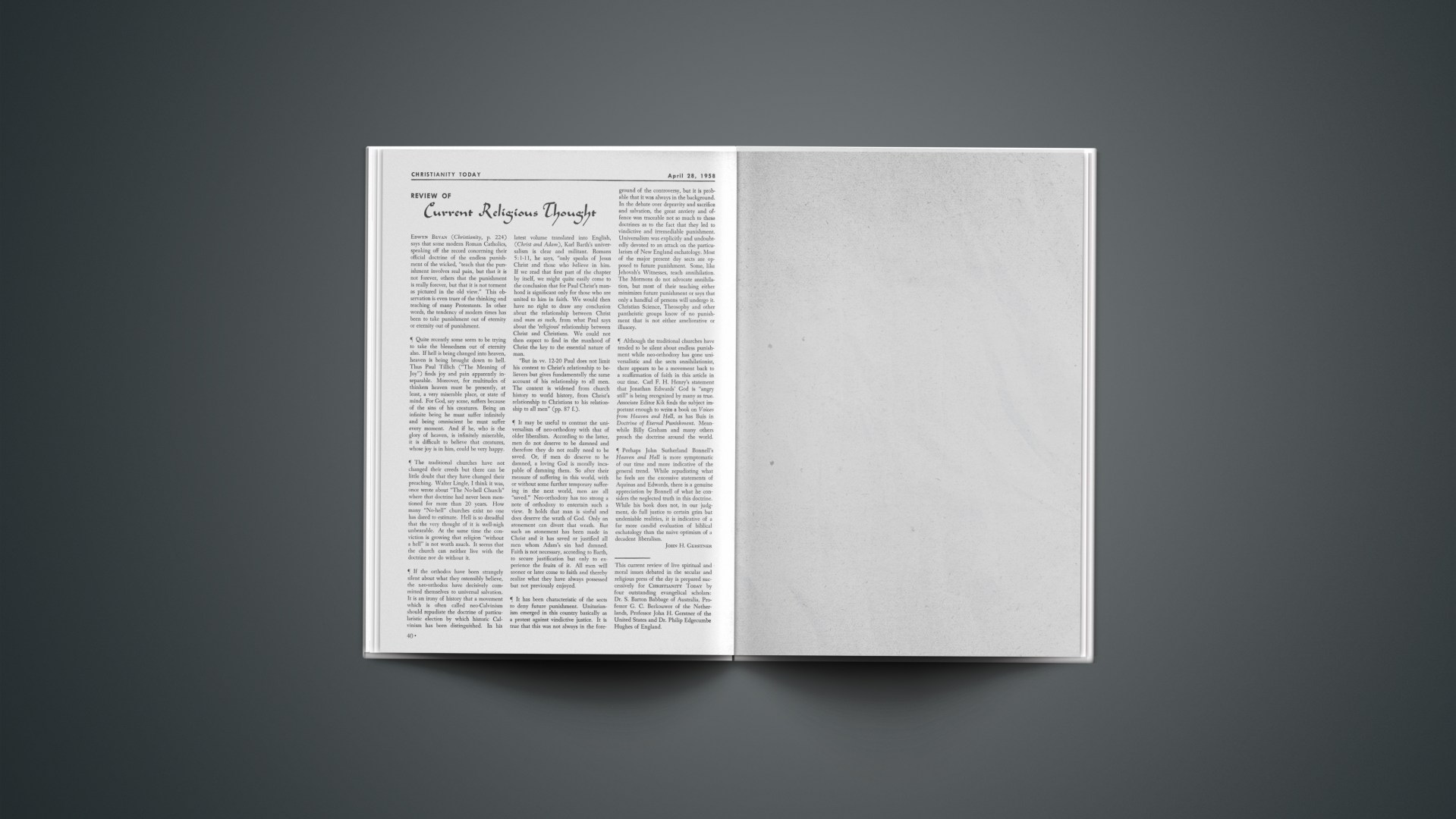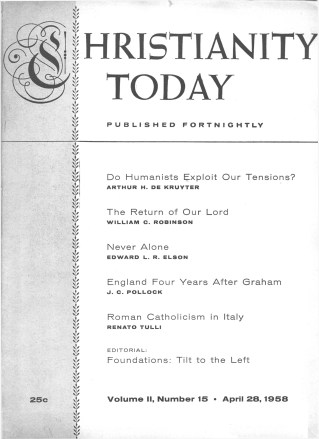EDWYN BEVAN (Christianity, p. 224) says that some modern Roman Catholics, speaking off the record concerning their official doctrine of the endless punishment of the wicked, “teach that the punishment involves real pain, but that it is not forever, others that the punishment is really forever, but that it is not torment as pictured in the old view.” This observation is even truer of the thinking and teaching of many Protestants. In other words, the tendency of modern times has been to take punishment out of eternity or eternity out of punishment.
Quite recently some seem to be trying to take the blessedness out of eternity also. If hell is being changed into heaven, heaven is being brought down to hell. Thus Paul Tillich (“The Meaning of Joy”) finds joy and pain apparently inseparable. Moreover, for multitudes of thinkers heaven must be presently, at least, a very miserable place, or state of mind. For God, say some, suffers because of the sins of his creatures. Being an infinite being he must suffer infinitely and being omniscient he must suffer every moment. And if he, who is the glory of heaven, is infinitely miserable, it is difficult to believe that creatures, whose joy is in him, could be very happy.
The traditional churches have not changed their creeds but there can be little doubt that they have changed their preaching. Walter Lingle, I think it was, once wrote about “The No-hell Church” where that doctrine had never been mentioned for more than 20 years. How many “No-hell” churches exist no one has dared to estimate. Hell is so dreadful that the very thought of it is well-nigh unbearable. At the same time the conviction is growing that religion “without a hell” is not worth much. It seems that the church can neither live with the doctrine nor do without it.
If the orthodox have been strangely silent about what they ostensibly believe, the neo-orthodox have decisively committed themselves to universal salvation. It is an irony of history that a movement which is often called neo-Calvinism should repudiate the doctrine of particularistic election by which historic Calvinism has been distinguished. In his latest volume translated into English, (Christ and Adam.), Karl Barth’s universalism is clear and militant. Romans 5:1–11, he says, “only speaks of Jesus Christ and those who believe in him. If we read that first part of the chapter by itself, we might quite easily come to the conclusion that for Paul Christ’s manhood is significant only for those who are united to him in faith. We would then have no right to draw any conclusion about the relationship between Christ and man as such, from what Paul says about the ‘religious’ relationship between Christ and Christians. We could not then expect to find in the manhood of Christ the key to the essential nature of man.
“But in vv. 12–20 Paul does not limit his context to Christ’s relationship to believers but gives fundamentally the same account of his relationship to all men. The context is widened from church history to world history, from Christ’s relationship to Christians to his relationship to all men” (pp. 87 f.).
It may be useful to contrast the universalism of neo-orthodoxy with that of older liberalism. According to the latter, men do not deserve to be damned and therefore they do not really need to be saved. Or, if men do deserve to be damned, a loving God is morally incapable of damning them. So after their measure of suffering in this world, with or without some further temporary suffering in the next world, men are all “saved.” Neo-orthodoxy has too strong a note of orthodoxy to entertain such a view. It holds that man is sinful and does deserve the wrath of God. Only an atonement can divert that wrath. But such an atonement has been made in Christ and it has saved or justified all men whom Adam’s sin had damned. Faith is not necessary, according to Barth, to secure justification but only to experience the fruits of it. All men will sooner or later come to faith and thereby realize what they have always possessed but not previously enjoyed.
It has been characteristic of the sects to deny future punishment. Unitarianism emerged in this country basically as a protest against vindictive justice. It is true that this was not always in the foreground of the controversy, but it is probable that it was always in the background. In the debate over depravity and sacrifice and salvation, the great anxiety and offence was traceable not so much to these doctrines as to the fact that they led to vindictive and irremediable punishment. Universalism was explicitly and undoubtedly devoted to an attack on the particularism of New England eschatology. Most of the major present day sects are opposed to future punishment. Some, like Jehovah’s Witnesses, teach annihilation. The Mormons do not advocate annihilation, but most of their teaching either minimizes future punishment or says that only a handful of persons will undergo it. Christian Science, Theosophy and other pantheistic groups know of no punishment that is not either ameliorative or illusory.
Although the traditional churches have tended to be silent about endless punishment while neo-orthodoxy has gone universalistic and the sects annihilationist, there appears to be a movement back to a reaffirmation of faith in this article in our time. Carl F. H. Henry’s statement that Jonathan Edwards’ God is “angry still” is being recognized by many as true. Associate Editor Kik finds the subject important enough to write a book on Voices from Heaven and Hell, as has Buis in Doctrine of Eternal Punishment. Meanwhile Billy Graham and many others preach the doctrine around the world.
Perhaps John Sutherland Bonnell’s Heaven and Hell is more symptomatic of our time and more indicative of the general trend. While repudiating what he feels are the excessive statements of Aquinas and Edwards, there is a genuine appreciation by Bonnell of what he considers the neglected truth in this doctrine. While his book does not, in our judgment, do full justice to certain grim but undeniable realities, it is indicative of a far more candid evaluation of biblical eschatology than the naive optimism of a decadent liberalism.
This current review of live spiritual and moral issues debated in the secular and religious press of the day is prepared successively for CHRISTIANITY TODAY by four outstanding evangelical scholars: Dr. S. Barton Babbage of Australia, Professor G. C. Berkouwer of the Netherlands, Professor John H. Gerstner of the United States and Dr. Philip Edgecumbe Hughes of England.









